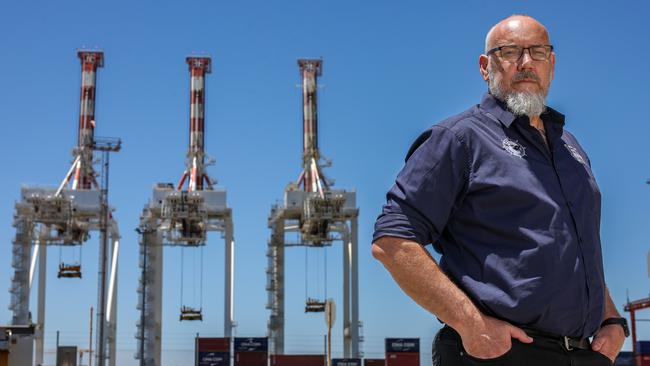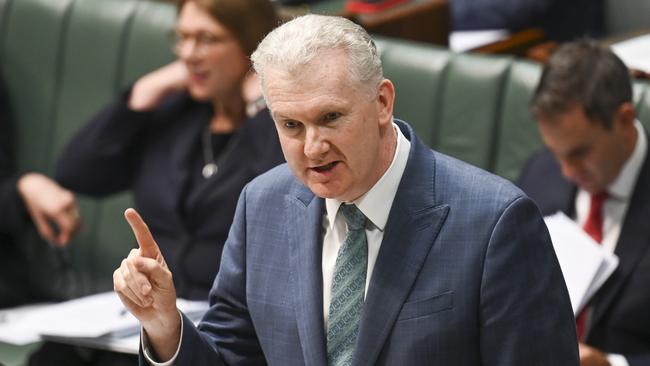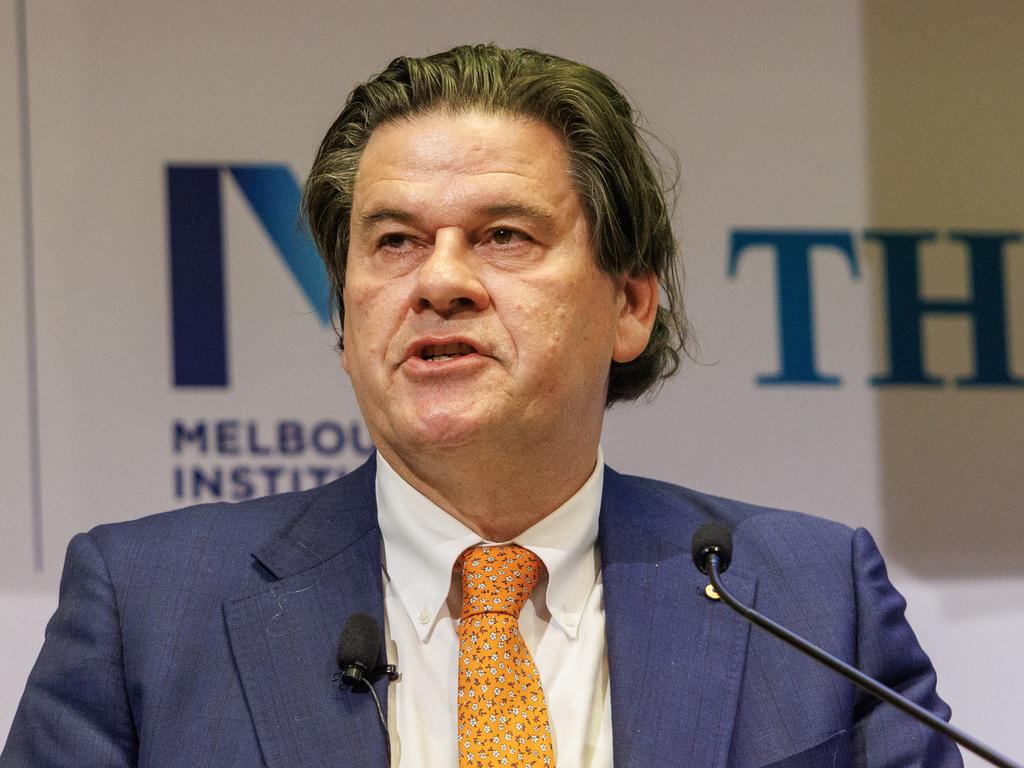‘Labor must act on ports battle’, warns economist Shane Oliver
Major shipping terminals may shut down for 16 hours in a dramatic ramp up of the industrial dispute between DP World and union workers.

Major shipping terminals may shut down for 16 hours in a dramatic ramping up of the industrial dispute between DP World and union workers, with economists and business groups warning inflation will be back on the rise if the Albanese government does not step in and force an immediate resolution.
The Fair Work Commission’s green light for stop-work action on Friday came after the Maritime Union of Australia led stoppages on terminals responsible for about 40 per cent of Australia’s shipping freight.
There were complete shutdowns of DP World container terminals on Friday in Sydney, Brisbane and Fremantle, with a partial ban in place in Melbourne.
“DP World is willing to continue to negotiate with the MUA to get a deal as soon as possible to stop the financial impact to the economy,” said DP World Oceana chief Nicolaj Noes after the company confirmed the FWC ruling.
The MUA is pursuing a 16 per cent pay rise for stevedores over two years, in a deal that would see DP World staff paid nearly as much as the more productive workforce at rival Patrick Corporation.
Business leaders are concerned the two-year length of the MUA proposal could pave the way for strike action across the nation’s ports from 2025, as the enterprise agreements of the three major operators would end in the same year allowing for multi-employer bargaining.
The MUA – a division of the militant CFMMEU – is required to give DP World five days notice for its permitted 16-hour stop-work action, in what is the most serious workplace dispute on the ports since Chris Corrigan and the Howard government took on the unions a quarter of a century ago. The federal government has resisted pleas to intervene and force the industrial umpire to make an immediate ruling on a new workplace deal, amid concerns the stand-off has the potential to last another five months.
Industrial Relations Minister Tony Burke on Friday said it was “in everyone’s interests that this be resolved”, but he would not commit to intervening.
“I urge both parties to return to the table and work around the clock to get an agreement,” Mr Burke said.
AMP Capital chief economist Shane Oliver urged the government to immediately intervene in the issue, warning there could be dramatic economic consequences if the dispute was protracted.

“The strike actions at the ports are actually worse (for the Australian economy) than the problems in the Middle East with the Red Sea disruptions,” Mr Oliver said.
“It certainly does pose some upside risk to inflation and would worry the Reserve Bank.”
Mr Oliver said he was surprised the government had not intervened on the issue, given how integral the ports are to the economy and the supply of goods.
“The government has been trying to provide cost-of-living relief but if ports aren’t functioning properly then it is just going to add to cost-of-living pressures,” he said. “It is better to get the two parties together and nut out a solution rather than let it drag on.”
Independent economist Chris Richardson said the port dispute “hurts on a variety of fronts”.
“The nation really needs a resolution because it is costing us heaps,” Mr Richardson said.
“Inflation has come down in Australia and around the world pretty well so far and there hasn’t been a big cost on unemployment. But the key part of that is the big supply (delays) left over from Covid and the war in Ukraine have been getting better.
“This strike coming on top of the Houthi impact on oil trade sets us back,” he said
The port delays affect importers such as Coles, Woolworths, JB Hi-Fi, Harvey Norman and others, while any companies that export goods would also be experiencing disruptions.
Fletcher International Exports founder Roger Fletcher said that coming on top of drone attacks in the Red Sea and drought impacting the Panama Canal, the chaos at Australian ports could and should be fixed.
“Get on and fix the bloody thing up,” Mr Fletcher said. “It’s not just about meat; what about all the farmers’ perishable food products? Think about those poor buggers. It’s not a good look when people are hungry in the world and food is going to waste.”
Business Council of Australia CEO Bran Black said it was clear the MUA and DP World stand-off was “causing significant damage to the economy”.
“Given the country’s No.1 priority must be fighting inflation and keeping costs down, those who can lean in to help resolve this dispute, including government, should do so urgently to avoid any further escalation,” Mr Black said.
MUA assistant national secretary Adrian Evans said exporters and importers were right to be angry and accused the Dubai-owned DP World of “failing the pub test” when it came to paying fair wages.
“Customers of this multi-billion dollar company have every right to be frustrated with DP World’s refusal to negotiate and should demand that DP World CEO Nicolaj Noes gets to the table and settles the dispute,” Mr Evans said. “This is the Dubai government holding our country to ransom if its Australian workforce don’t accept a pay cut in a cost of living crisis.”
Australian Industry Group chief Innes Willox said bosses were looking at the worsening ports dispute and “making early preparations for standdowns and layoffs in case it is not resolved in the next week or two”.
“A wide range of businesses are reporting plans to either shut down or stand down staff over the next two weeks,” Mr Willox said.
“With one in four jobs reliant on trade and global supply chains being stretched to breaking point by the Red Sea conflict, the port dispute risks being the final straw for businesses making hard decisions about a tough year ahead.
“The dispute is impacting businesses far and wide including food production, manufacturing, construction, energy providers and transport and logistics.”
Mr Willox said the MUA was attempting to make all port enterprise agreements expire in 2025, paving the way for multi-employer bargaining in the sector and risking “massive industrial disruption and economic dislocation next year”.
Opposition workplace relations spokeswoman Michaelia Cash accused the Albanese government of keeping its “head in the sand” over the issue.
“This dispute is making Australia’s cost-of-living crisis even worse. Australians cannot afford the inaction of this weak Albanese government,” Senator Cash said.
“Minister Burke specifically has the power to intervene in a dispute if it is doing or likely to do significant harm to the economy.”






To join the conversation, please log in. Don't have an account? Register
Join the conversation, you are commenting as Logout